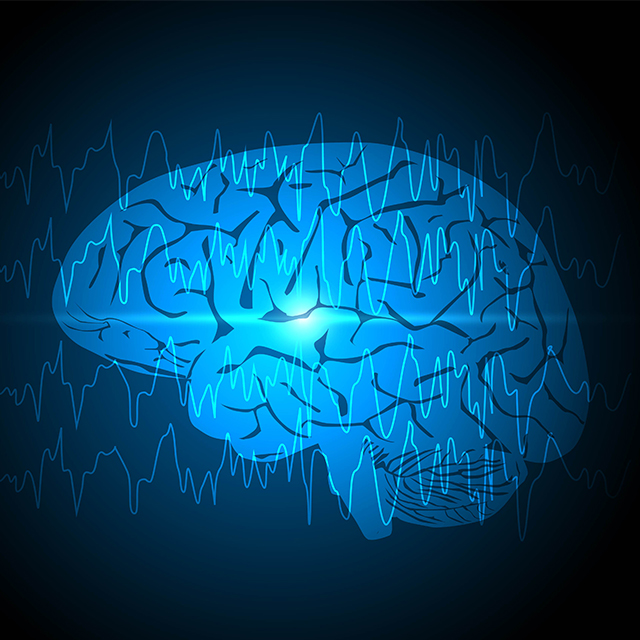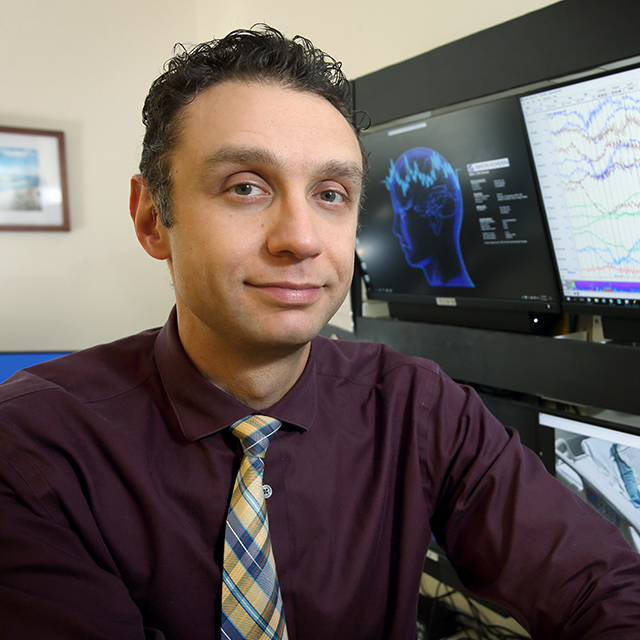Johns Hopkins Names New Director of Epilepsy Center
Neurologist Nathan Crone sets sights on evolving the Johns Hopkins Epilepsy Center’s treatment options and research enterprise.

Nathan Crone
The Johns Hopkins Epilepsy Center, an international destination for patients seeking surgical and nonsurgical management of drug-resistant epilepsy, has a new leader. Nathan Crone, the center’s director, aims to further the center’s research and treatment options while collaborating with the neurology community at large via cutting-edge research.
“Our mission is to innovate our clinical services and provide the latest approaches to the management of epilepsy, especially for patients who haven’t responded to first-line therapies,” says Crone, who, in addition to leading the center, is the new head of the Division of Epilepsy and Clinical Neurophysiology at Johns Hopkins.
Crone follows Gregory Bergey as division director. An authority and renowned researcher in epilepsy, including treatment device development, Bergey retired from Johns Hopkins in September 2024. During his tenure, Bergey recruited more than 20 faculty members, bolstered programs for early-career researchers and improved education for trainees.
“Dr. Bergey leaves an amazing legacy that I hope to continue and expand upon,” Crone says.
Crone, who first joined Johns Hopkins as a fellow in the early 1990s, now leads a multidisciplinary research program that seeks to enhance the efficacy and safety of epilepsy surgery. Using advanced neuroengineering technology, he and his team also study the neural mechanisms of speech and motor function, and they develop assistive devices for patients with impaired motor function due to other neurological disorders.
In addition to medical and surgical management of epilepsy, Crone’s clinical pursuits include interpretation of acute and long-term EEG recordings and intraoperative monitoring to help ensure the safety of neurosurgical procedures.
Crone says he hopes to work closely with referring physicians and the neurology and neurosurgery communities at large to give patients access to the most effective treatments available.
Research Initiatives
“An important focus of our research is understanding normal and abnormal brain networks in order to enhance the efficacy and safety of surgery,” Crone says. “My colleagues and I are also working to understand the underlying mechanisms of how seizures are generated and spread through brain networks and how neuromodulation can help control seizures.”
Crone and other faculty members in the division collaborate closely with Johns Hopkins University engineers and computer scientists who use advanced signal processing and the latest AI techniques to better identify the source of seizures and how best to intervene surgically or medically.
Johns Hopkins is performing clinical research that few centers in the country are conducting. For example, it is among a small number of centers studying a smart watch app that can help detect tonic-clonic seizures and alert caregivers. Applying what he has learned from brain mapping during epilepsy surgery, Crone’s research also investigates restoration of communication by patients who can’t speak due to muscle weakness from amyotrophic lateral sclerosis (ALS) and other neurological disorders. The center is one of only two in the U.S. studying an implantable brain-computer interface in such patients.
Epilepsy Center faculty members are also developing and refining a variety of emerging epilepsy treatments including neuromodulation, dietary therapies and new antiseizure medications. Additionally, clinician-scientists are studying cell models of epileptic networks, abnormal brain activity in patients who are critically ill and the causes and outcomes of incident epilepsy in older adults.
To refer an adult patient to the epilepsy center, call 410-955-9441. To refer a pediatric patient, call 410-955-9100.
For Clinicians Clinical Connection
Clinicians, discover the latest in research and clinical innovation from Johns Hopkins experts. Access educational videos, articles, CME courses and other resources from our world-renowned institution.
Related Reading
-
Identifying the Seizure Onset Zone Through Single-Pulse Electrical Stimulation
New study by Johns Hopkins researchers could significantly shorten monitoring time before epilepsy surgery and improve outcomes.

-
Johns Hopkins Pediatric Epilepsy Surgery Program Expands
Pediatric epileptologist Ahmad Marashly joins the institution as the team's multidisciplinary experts apply new technologies and resources to provide potentially curative options for the youngest patients with epilepsy. The program is among the few of its kind in the U.S.

